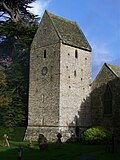| Church of St James, Kinnersley | |
|---|---|
 A Grade I listed church with decoration by George Frederick Bodley | |
| 52°08′28″N2°57′28″W / 52.141°N 2.9577°W | |
| Location | Kinnersley, Herefordshire |
| Country | England |
| Denomination | Anglican |
| History | |
| Status | Parish church |
| Architecture | |
| Functional status | Active |
| Heritage designation | Grade I |
| Designated | 2 September 1966 |
| Architectural type | Church |
| Administration | |
| Diocese | Diocese of Hereford |
| Parish | Kinnersley |
| Clergy | |
| Vicar(s) | Rev. Janet Greenfield |
The Church of St James is a Church of England parish church at Kinnersley in the English county of Herefordshire. It is a Grade I listed building.








